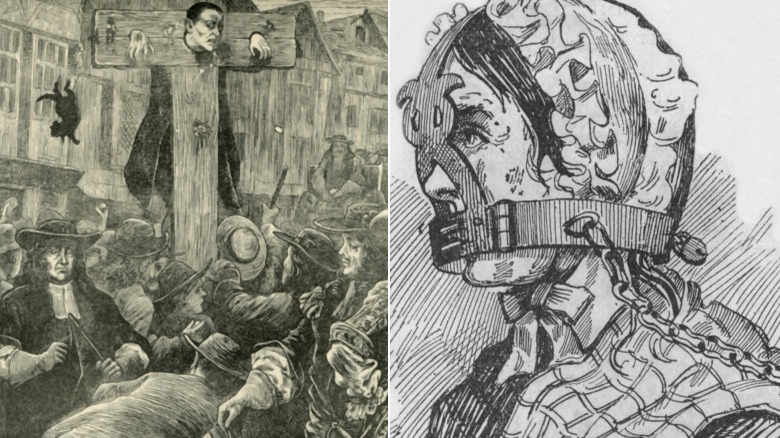What Really Happened To Criminals During Medieval Times
The Middle Ages were a chaotic time in history. The fall of the Roman Empire, invasions by various nomadic tribes, restructuring of governments, clashes between religions, and that little pandemic known as the Black Death all happened during this time. This era spanned multiple generations and centuries, and while there was a lot of moving and shaking going on, there are some things that remained an aspect of society no matter how things were going. One of those things was crime.
Every society in history has those members who don't like to follow the rules, which often results in them being labeled as criminals. In Europe, the period known as the Middle Ages was no different, but how society chose to punish these criminals for their actions is a source of morbid fascination for many today. According to Museum Facts, committing crimes during this time period was actually tough business. The punishments for violating the laws of the land were often very harsh, and honestly, could be pretty bizarre. Even some of the most common or relatively harmless crimes could result in strange or even permanent consequences. Some of the most common offenses that were committed during this time were things like disturbing the peace, poaching, theft, blasphemy, and treason, according to History of Yesterday.
Fines and flogging, torture and execution
When you think about it, it makes sense that the people would often get too rowdy or steal things. There were not as many police in the streets, and people liked to drink, which in turn could lead to arguments or even fighting in the streets. The average person was often pretty poor during this time, so they may have turned to theft or poaching.
One of the most common punishments for disturbing the peace was being placed in a pillory (similar to stocks — pictured above left) at the center of town for a designated amount of time. For stealing or poaching, you could get anywhere from a large fine, to execution, but oftentimes public flogging was the go-to.
Many would also think that the highest consequence for any crime committed would be death. While in most cases that would be true, those in medieval times decided that simple death might not be enough sometimes. So they got creative. According to Bustle, these punishments varied from the strange to the horrible. On the weird side, you could be forced to apologize for your crimes while wearing a sheet, or wearing an animal mask or awful badge in public. From there things only got worse if your crime was deemed awful enough. They went as far as suffocating people using mud, and invented things like the scold's bridle (designed specifically to silence women — above, right). Usually torture was not the first choice, but for particular crimes like heresy and blasphemy, the punishments were generally more severe.

